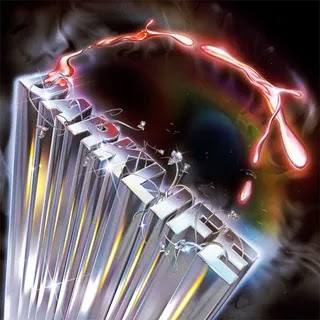On a new double album, the experimental collective continues its journey from vaporwave toward fractured, maximalist pop music.
death’s dynamic shroud began with a Sega Dreamcast and a case of the flu. During Christmas 2013, James Webster attempted to persuade his friend and fellow Dayton, Ohio musician Tech Honors that the open-world game Shenmue could be experienced as “an interactive vaporwave album.” Sick at home on New Year’s Eve, he then created a woozy collection of songs called シェンムーONLINE entirely out of samples from the game. Honors responded with his own vaporwave album, and the NUWRLD mixtape series was born under the shared alias death’s dynamic shroud.wmv. Their work soon attracted the attention of Orange Milk Records co-founder Keith Rankin, also a veteran of the Dayton experimental music scene, who went on to release Honors’s 世界大戦 OLYMPICS and to collaborate with Webster on 신세기 EVANGELIS in 2014. Since then, death’s dynamic shroud has been the umbrella name under which Webster, Honors, and Rankin release music, solo or in collaboration.
While the NUWRLD mixtape series now comprises over 30 installments, the official death’s dynamic shroud albums tend to be major statements. Webster and Rankin’s 2015 release I’ll Try Living Like This upped their production value substantially by trading washed-out tape warble for CD-quality sheen, while 2017’s Heavy Black Heart was the first release to feature all three artists. Their latest LP, Darklife, a double album again featuring the complete trio, represents a concerted effort toward greater accessibility, backed by a months-long, four-single campaign from their new label 100% Electronica—a dramatic change for a band accustomed to the quick-drop approach of vaporwave. It also represents a significant artistic evolution, completing their journey away from vaporwave and toward complexly fractured, maximalist pop.
Darklife documents DDS’s humanity emerging from their once purely digital world. While it still features the internet-damaged sample manipulation that has become their trademark, it also incorporates more original production, instrumentation, and vocals than previous releases. Often this approach leads to effective juxtapositions, as in “Neon Memories,” when Honors’ vocals meld with a screaming synth until a glitch reintroduces the candy-pop chorus. Lyrically, the album also explores this transition from robotic to human. Album opener “Stay” features a computerized voice intoning, “Where consciousness makes no difference at all/The apartment and the garden/They might as well have never even happened.” In closing track “Dark Matter,” Tech Honors repeats these lyrics in a very human tenor, giving the same words a raw emotional resonance.
death’s dynamic shroud is at their best when indulging in crowd-pleasing excess. The outsized “Judgment Bolt,” with its blown-out bass, super-chopped vocals, and wall of synths, exemplifies what makes the project exciting, both live and in studio. The more subdued moments are just as compelling, like “Light Left the Garden,” a carefully composed ballad whose tentative build climaxes in the unsettlingly romantic line, “When I talked to you/If you’d asked me to/I would have killed the president.” Elsewhere, “I Just Wanted to Know Love” forgoes percussion entirely except for a brief flutter, gaining momentum from gradually layered synths and weepy samples from a soap opera. These smaller-scale tracks have the effect of zooming in from a neon cityscape to focus on the human dramas taking place at street level.
Across 15 songs totaling over an hour, death’s dynamic shroud attempt to include a full spectrum of atmospheres and styles created through the alchemy of their collaboration. Sometimes this density detracts from the cohesiveness of the album: The nightmare clatter and bang of “After Third Heaven” sits uneasily among the syrupy sweetness of its surrounding tracks, while the fourth side of the album lags with the six-minute “Rare Angel,” which feels like an obstacle to the finale. This is a problem of too many ideas competing for space—but then again, we shouldn’t expect anything else from these musicians’ hyper-frenetic, supersized world.



0 comments:
Post a Comment